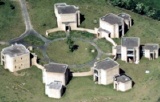Introduction to GPU Programming Summer School
Wednesday 11th and Thursday 12th July 2018
Organisers: David Quigley (Physics/CSC) and Magnus Richardson (SBIDER/MathSys)
Note: We will be using Scientific Computing RTP facilities so registration is restricted to Warwick University students and staff.
Scope of the Summer School
Most modern computers have a graphics card that can be used for general purpose computation. These are powerful hardware components that can run suitably written code up to 1000s of times faster than on a CPU. General purpose GPU programming has been a rather niche area, given the level of computer expertise reqired to get started. However, access to the power of GPUs is becoming more democratized with the greater availability of numerical libraries and high-level interfaces through the popular Python and Julia languages. The school will provide a basic introduction to GPU programming and the associated Center for Scientific Computing facilities. The target audience is people with no knowledge whatsoever of GPU programming. The programming languages to be used are Python (some very basic knowledge required) and C (no prior knowledge required). We will be providing some basic tutorials and further information on setting up your laptop before the School.
Computer Access Requirements
Participants will need an SCRTP Desktop Account and access to the Tinis HPC cluster. Getting desktop access is straightforward: when asked on the form MathSys students should use the CDT as the department and (for PhD students) their own supervisor or (for MSc students) Richardson as supervisor. Non CDT students can choose Quigley as supervisor if only applying to gain access for this course, otherwise choose your research supervisor. Staff participating in the School will need staff-level access. Getting an account on Tinis is marginally more complicated and not instantaneous, requiring sign-off by an SCRTP human and generation of a cryptographic key. We will be running a drop-in session before the Summer School to help with any difficulties encountered setting up the Tinis account. You must ensure that you have full access before the School starts as we will not be able to help with that once the School is underway. Both accounts will be of general use after the School for those needing high-performance computing at Warwick.
Programme
The school will feature tutorials delivered by David Quigley and supported by the Research Software Engineering group of the SCRTP, talks from users of GPUs and will close with an event on entrepreneurship on the evening of the 12th July. All events will take place in the Warwick Mathematics Institute.
| Wednesday 11th July 2018 | |
|---|---|
| 9.30am-10.00pm | Registration and coffee (Complexity Common Room, Zeeman Building) |
| 10am-12pm | Tutorial 1 delivered by David Quigley |
| 12pm-1pm | Lunch in the Complexity Common Room, Zeeman Building |
| 1pm-2pm | Talk: Dr Wes Armour, University of Oxford (Room B3.02, Zeeman Building) GPU accelerated signal processing for next generation radio telescopes |
| 2pm-3pm | Talk: Professor Till Bretschneider and Dr Piotr Baniukiewicz, University of Warwick (Room B3.02, Zeeman Building) 3D Cell Segmentation using a graph based Random Walk method: A jCuda example for using cusparse and cublas libraries for solving large sparse linear systems |
| 3pm-3.30pm | Coffee |
| 3.30pm-4.30pm | Talk: James McClung, NVIDIA (Room B3.02, Zeeman Building) GPU Computing |
| Thursday 12th July 2018 | |
| 9.30am-10.00pm | Coffee in the Complexity Common Room, Zeeman Building |
| 10am-12pm | Tutorial 2 delivered by David Quigley |
| 12pm-1pm | Lunch in the Complexity Common Room, Zeeman Building |
| 1pm-4pm | Tutorial 3 delivered by David Quigley |
| 4pm-5pm | Break |
| 5pm-late | Entrepreneur First event followed by dinner (Room B3.02, Zeeman Building) “Doing a PhD in a technical subject and interested in startups, but don't really know where to start? Join us for an evening of pizza, beer and like-minded company to hear the story of how an Entrepreneur First Alum commercialised their research to create a potentially world-changing company.” |
Note: if you plan to attend the Entrepreneur-First event please see here for details and sign up.
See also:
Mathematics Research Centre
Mathematical Interdisciplinary Research at Warwick (MIR@W)
Past Events
Past Symposia
Where possible, visitors should obtain an EDUROAM account from their own university to enable internet access whilst at Warwick.
You can register for any of the symposia or workshops online. To see which registrations are currently open and to submit a registration, please click hereLink opens in a new window.
Mathematics Research Centre
Zeeman Building
University of Warwick
Coventry CV4 7AL - UK
E-mail:
MRC@warwick.ac.uk

